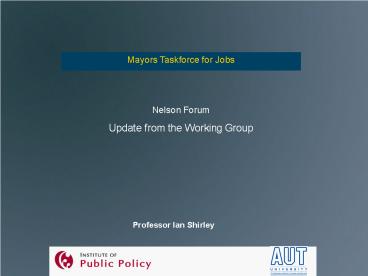Mayors Taskforce for Jobs - PowerPoint PPT Presentation
Title:
Mayors Taskforce for Jobs
Description:
family and household formation and the supply and demand of goods ... in Australia led by Professor Bill Mitchell at the University of Newcastle ... – PowerPoint PPT presentation
Number of Views:26
Avg rating:3.0/5.0
Title: Mayors Taskforce for Jobs
1
Mayors Taskforce for Jobs
Nelson Forum Update from the Working Group
Professor Ian Shirley
2
Introduction
Several themes emerge from the profile of a
senior citizen relevance to this update for the
Mayors Taskforce
- Conditions that gave rise to the establishment
of the Taskforce
- Changing regional, national and international
environments in which - we live and work
- The myths that continue to shape policy options
for local and regional - government
The 30 year life
LIFE
Old Age Redundancy
Youth Ghetto
Death
Birth
Continuum
3
The 30 year life is a conceptual model which
captures the outcome of three significant trends,
namely
? changing profile of the New Zealand
population ? changing dynamics of the labour
market ? changing policy priorities and
practices
These trends explain why the Mayors Taskforce was
established and why the focus has been
concentrated predominantly on youth unemployment
and the job guarantee
Changing population trends and projections
? the enduring mythology of an ageing
population in reality a youthful
population and this is reinforced when you
examine dependency ratios ? internal and
external migration urbanisation and rural
depopulation ? family and household formation
and the supply and demand of goods
and services home ownership, capital assets
4
The Changing Dynamics of the Labour Market
? Major shifts occurred through the 1980s and
early 1990s ? Unemployment was treated as an
adjustment problem ? Short-term solutions
employed to provide welfare for the unemployed ?
National databases failed to capture what was
happening especially at the interface between
households and firms ? Macro-policy settings and
practices failed the regions and they failed
local and regional government ? Focus on big
business and short-term profitability rather than
small business which provides the bulk of
employment opportunities
5
Changing policy priorities and practices
Changes occurred over a period of two decades
represented a major transition from the command
economy ? economic vulnerability ? economic
rationalisation
There were a number of benefits that came from
these radical shifts in policy but there were
also major deficits ? the productive sectors of
the economy were undermined ? structural
unemployment increased dramatically long-term
unemployment work-rich and work-poor
households ? New Zealand incurred a substantial
social deficit deprivation communities of
choice and communities of fate ? reversed the
distinctive policy arrangements and priorities
which made New Zealand one of the most successful
countries in the OECD
6
The mythology of the welfare state
- ? based on a concept of social security that
characterised European countries but which was
never the focus of economic and social policy in
New Zealand - ? industrial conciliation and arbitration (1894)
a wage sufficient to provide for a household
with two or three children - ? family wage extended during the 1930s to
include access to education and health services
and the provision of state housing a very
selective benefit system for those outside the
labour market - ? full employment for men as a means of securing
household income - ? A set of arrangements based around full
employment and a fair wage which led to New
Zealands reputation as a social laboratory for
the world
7
- ? the Mayors Taskforce for Jobs was established
to address long-term unemployment across cities,
districts and regions of New Zealand - ? The escalation in long-term unemployment and
the failure of both central government and the
wider community to address the waste of human
resources evident over two decades led to a group
of Mayors identifying and accepting a leadership
role in employment - ? In particular the focus has been on what is
described as a youth guarantee that all young
people under 25 years of age be in paid work, in
training or education, or in useful activities in
the community - ? The focus on the youth job guarantee is one of
the central issues that our working group has
been asked to consider on behalf of the Mayors
Taskforce - The proposition emerges from national employment
plans in Europe and was first raised with the
Mayors Taskforce in 2001 - It has also been the subject of a major research
programme in Australia led by Professor Bill
Mitchell at the University of Newcastle
8
The Working Group has focussed on the following
tasks
- an examination of the youth job guarantee as
implemented in other countries with a view to
exploring its feasibility in New Zealand - A summary of the changing dynamics of the labour
market with some emphasis on the skills deficit
which has emerged as a major problem today - A review of transition projects for youth with
emphasis on the interface between education and
paid employment - A reassessment of regional and national
initiatives aimed at promoting employment
opportunities and economic participation
The working group will finish its task early in
2006 with the intention of informing the schedule
of work and priorities of the Mayors Taskforce






























